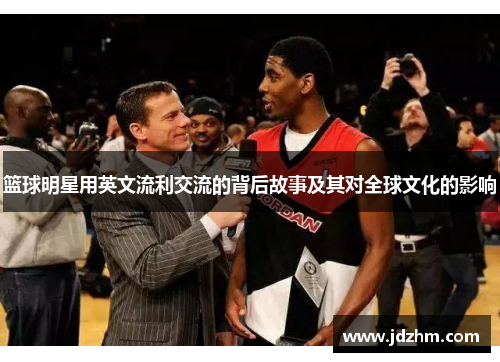Basketball, as one of the most globally recognized sports, has transcended geographical and cultural boundaries to influence not just athleticism, but also language, identity, and global communication. The ability of basketball stars to speak English fluently is a fascinating phenomenon that holds deeper cultural implications. This essay will explore the stories behind basketball stars' proficiency in English, and the far-reaching impacts this skill has on global culture. It will delve into how basketball icons' language fluency reflects the globalizing forces of the NBA, the role of media in shaping international perceptions, the integration of English into global fan communities, and the personal narratives of players that reflect the evolving nature of cultural exchange. Each of these aspects contributes to an understanding of how basketball stars, through their linguistic capabilities, have become ambassadors for not only their sport but also for a global culture that embraces diversity, communication, and inclusivity.
1、全球化进程中的NBA
Basketball has become a global sport, and the NBA, as the premier professional basketball league, is at the forefront of this phenomenon. The NBA's expansion across continents has brought together players from all corners of the world. As these players represent diverse cultures, speaking English fluently has become an essential tool for integration and communication within the league. The ability to speak English allows athletes to build relationships with their teammates, coaches, and the media, as well as engage with fans in various countries.
Many basketball stars come from countries where English is not the first language, yet they choose to learn the language in order to thrive in the NBA. Players like Dirk Nowitzki (Germany), Yao Ming (China), and Giannis Antetokounmpo (Greece) have all demonstrated their linguistic abilities by communicating effectively in English, despite it being their second language. This linguistic adaptation is not merely a practical necessity but also an indicator of their understanding of the global nature of the NBA. By embracing English, these players signify their recognition of the cultural bridge the language creates between them and their international fan base.
新利体育官网As the NBA continues to grow in popularity around the world, the importance of language fluency among players cannot be overstated. A globalized sport like basketball relies on the ability to communicate across linguistic and cultural barriers. In many ways, the English language has become the common denominator that unites players, coaches, and fans alike, and it is a crucial element in the NBA's ongoing expansion into new markets. Players’ fluency in English allows them to connect with fans from diverse backgrounds, breaking down cultural and geographical divides.
2、媒体影响与国际化传播
The role of the media in amplifying the influence of basketball stars cannot be ignored. With the advent of social media, news outlets, and global broadcasting platforms, basketball players have become international celebrities. As media platforms in different countries broadcast NBA games and interviews, players who speak English fluently are able to engage with a broader audience. Through interviews, press conferences, and social media posts, basketball stars have become powerful global communicators.
The media's portrayal of basketball players is often heavily influenced by their ability to speak English. For example, players like LeBron James, Stephen Curry, and Kevin Durant have utilized their fluency in English to communicate with fans, endorse products, and advocate for social causes. Their command of the language allows them to connect with millions of fans worldwide, and their words carry weight, shaping public perceptions of the sport and its cultural significance. This type of media influence extends beyond basketball itself, impacting global culture by showcasing how sports figures can leverage their language skills for broader influence.
Moreover, the NBA has embraced the power of media in promoting the sport globally. Players who can speak English become key assets in the league’s marketing campaigns, interviews, and promotional events. Through media exposure, these athletes can reach fans in countries where basketball is still growing in popularity. The language barrier is no longer an issue, as English serves as a universal language for global communication, enabling players to create a personal connection with their audience and solidifying the NBA's role as a cultural force worldwide.
3、全球粉丝文化与跨文化交流
The rise of basketball as a global sport has led to the creation of a vast and diverse fan community. Fans from different parts of the world, from Asia to Europe to South America, follow the NBA and its players, often transcending language barriers to connect with the sport. The ability of players to speak English fluently has significantly contributed to the development of this global fan culture, as it provides a common ground for fans to interact with their idols and each other.
Social media platforms like Twitter, Instagram, and YouTube have allowed fans to interact with basketball players directly, despite differences in their native languages. For example, Chinese fans of Yao Ming were able to engage with him through his English-language posts on social media, even though many of them did not speak English as their first language. This kind of cross-cultural communication fosters a sense of unity among fans from various countries, as they can all share in the experience of supporting their favorite teams and players, regardless of where they are located.
Furthermore, the language of basketball itself—terms like "dunk," "fast break," and "three-pointer"—has become universal, with fans in non-English-speaking countries adopting English basketball terminology. This linguistic fusion illustrates how basketball has facilitated cultural exchange and the blending of languages. As players continue to speak English, they help bridge cultural gaps, making the sport more accessible and enjoyable for fans worldwide. In this way, English becomes not only a tool for communication but also a symbol of a shared global passion for the game.

4、篮球明星的个人故事与文化塑造
The personal stories of basketball stars also play a significant role in shaping the cultural impact of their English fluency. Many players come from humble beginnings and have had to learn English as part of their journey to success. For instance, the story of Manu Ginóbili, who learned English during his time playing in the United States, reflects the cultural adaptability required to succeed in the NBA. His journey from Argentina to becoming an NBA legend illustrates how learning English not only facilitated his professional career but also allowed him to connect with fans and teammates in ways that transcended linguistic barriers.
Similarly, players like Kobe Bryant, who spoke Italian fluently due to his childhood years spent in Italy, have embraced bilingualism as a part of their identity. Bryant’s fluency in both Italian and English helped him build connections with fans in Europe, contributing to his international appeal. The multilingualism of basketball stars is a testament to the evolving nature of cultural exchange in sports, where players not only bring their athleticism but also their cultural backgrounds and language skills to the forefront.
In addition, players’ ability to speak English fluently often becomes a symbol of their global status. It signifies their ability to navigate different cultures, and this fluidity enhances their ability to serve as ambassadors of basketball and culture worldwide. As these athletes become more than just sports figures, their linguistic skills allow them to become influential cultural icons who shape the values of global communities.
总结:
Basketball stars' fluency in English is more than just a functional skill; it reflects the broader trends of globalization and cultural exchange that are reshaping sports and communication. Through their language proficiency, players serve as bridges between cultures, facilitating the growth of basketball as a global sport. Their ability to communicate in English allows them to connect with fans and other players worldwide, fostering a sense of unity and shared passion for the game.
In conclusion, the fluency of basketball stars in English has not only influenced the sport itself but also contributed to the larger cultural conversation on globalization. As these athletes continue to leverage their language skills in both their professional and personal lives, they play a pivotal role in breaking down cultural barriers and promoting the values of inclusivity and diversity. The impact of these players goes beyond the basketball court, making them integral figures in the global cultural landscape.


